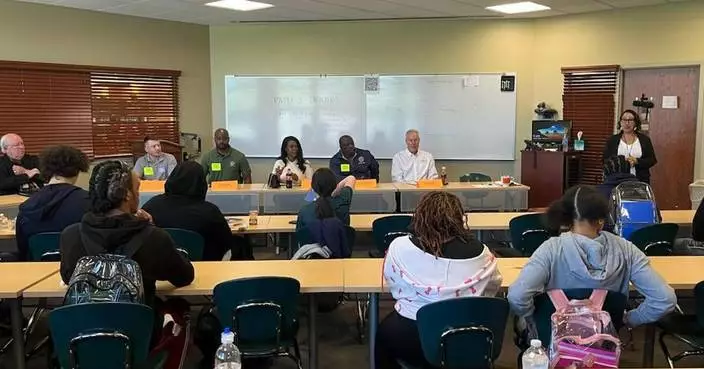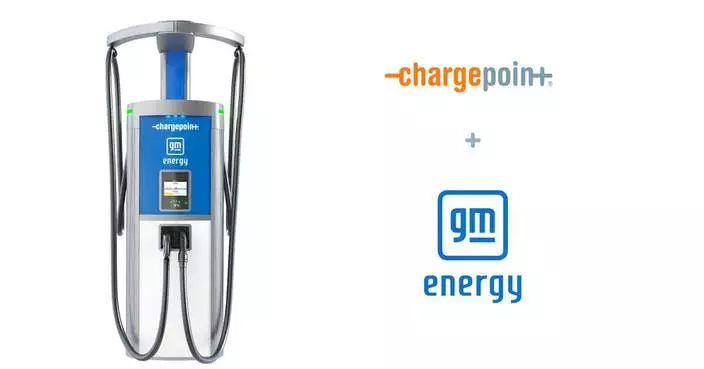LONDON (AP) — The ATP men's tennis tour paid out $1.3 million to a total of 26 players in 2024 under a new financial program called Baseline that guarantees minimum annual incomes for players ranked in the top 250.
Players received money in each of three categories, the tour said Wednesday, without naming most of the individuals: 17 got paid as part of minimum guarantees that make up the difference if players do not reach certain thresholds in singles prize money, three through injury protection that helps those whose tournament participation is limited by health issues, and seven via newcomer investment that provides funds to new members of the top 125.
One player received money from both the minimum guarantee and income protection parts of the plan, which was announced in August 2023. This season was the first of a three-year trial.
“As a professional tennis player, you’re focused on results. Relying on your performance to succeed can be difficult, especially when dealing with setbacks like injuries," said Bernabé Zapata Miralles, who got a minimum guarantee to boost his season's earnings. “We now have the comfort we need to improve, without the pressure of financial uncertainty.”
Based on 2023 year-end rankings and 2024 earnings, the ATP made up the difference for players who didn't reach certain thresholds: $300,000 for the top 100, $150,000 for men ranked from 101 to 175, and $75,000 for those from 176 to 250.
Those figures will rise next season to $200,000 for Nos. 101-175, and $100,000 Nos. 176-250.
Just for the sake of context, year-end No. 1 Jannik Sinner led men's tennis with $16.9 million in prize money in 2024, while No. 100 Federico Coria took home about $590,000, and No. 250 Abdullah Shelbayh earned just under $205,000 in singles.
“We’re giving players the financial support they need to overcome challenges and build a sustainable career," said ATP Chairman Andrea Gaudenzi, a former player.
Players need to sign up to be considered for the program and the tour hopes more will take part than the more than 100 who did in 2024.
AP tennis: https://apnews.com/hub/tennis

FILE- Italy's Jannik Sinner serves the ball to Russia's Daniil Medvedev during their singles tennis match of the ATP World Tour Finals at the Inalpi Arena, in Turin, Italy, Thursday, Nov. 14, 2024. (AP Photo/Antonio Calanni, File)
WASHINGTON (AP) — The kids seen by Dolores Mejia around suburban Phoenix have been growing heavier in recent years. Their parents, too, she says.
Mejia, a 75-year-old retiree, says she's also had her own weight struggles on the scale.
That's why Robert F. Kennedy Jr.'s pledge to “Make America Healthy Again” as he campaigned alongside Donald Trump caught her attention. She liked the questions Kennedy raised about the role of processed foods in America's obesity epidemic.
“I’m a junk food person," said Mejia, an ardent Trump supporter. “I started wondering where those extra pounds came from.”
After hearing Kennedy out, she concluded: “We cannot trust the health organizations we’ve trusted for years to tell us that our foods are safe.”
Republicans such as Mejia have embraced Kennedy, whose alliance with the president-elect could make the prominent environmentalist and vaccine skeptic the nation’s top health official next year. Republicans hold an overwhelmingly positive view of Kennedy, with most approving of Trump’s decision to put him in his administration, according to recent polling from The Associated Press-NORC Center for Public Affairs Research and AP VoteCast, a survey of more than 120,000 voters in the 2024 presidential election.
But Americans overall are less positive about Kennedy, and there isn't broad support for some of his views, which include closer scrutiny of vaccines.
If confirmed by the Senate, Kennedy will be charged with leading the Department of Health and Human Services, a $1.7 trillion agency that researches cancer, approves prescription drugs and provides health insurance for roughly half the country.
About 6 in 10 Republicans approve of Kennedy’s appointment to Trump's Cabinet and only about 1 in 10 disapprove, according to an AP-NORC poll conducted in December, while the rest aren't familiar with him or didn't have an opinion.
Kennedy's talk of healthy foods is what captured the attention of Natalie Moralez, a 32-year-old engineer in Albuquerque, New Mexico, who identifies as an independent.
She likes his promises to take on powerful companies. And she's eager to see him challenge the ingredients they use in the food she finds on supermarket shelves.
“Even just buying foods from the grocery store, like what else is in there?” Moralez said. “That’s my main concern, and hopefully he can figure out what the underlying issues are and see if we can do better.”
Kennedy doesn't fare as well among Americans overall, with about 4 in 10 U.S. adults disapproving and about 3 in 10 approving of his appointment.
Although Kennedy is a member of one of the most powerful Democratic dynasties in the country, most Democrats said they don't like that he's been named to Trump's Cabinet. About 6 in 10 Democrats “strongly disapprove” of the pick, the December poll found. That's a higher share of disapproval than other high-profile picks such as Pete Hegseth to be defense secretary or Marco Rubio for secretary of state.
Kennedy started his career as an environmental lawyer and won big lawsuits against companies over the chemicals used in weed killers and heavy metal smelters.
But in recent years, he's attracted a sizable and loyal following over his claims that vaccines, recommended and championed by the nation's public health agencies, are dangerous. That's despite decades of research, laboratory testing and real-world use that shows childhood vaccinations have prevented millions of deaths.
“There’s no vaccine that is safe and effective,” Kennedy said on a podcast in July 2023. During a Fox News interview the same year, he said he believes a repeatedly discredited idea that vaccines can cause autism. In recent days, Trump has increasingly suggested that the link between autism and vaccines should be studied — although decades of research has already concluded there is no connection between the two.
Trump and Kennedy allies have promised not to take away vaccines, instead saying they oppose government mandates and want to conduct more research on the vaccines.
But about half of voters want the government to be more involved in ensuring children are vaccinated for childhood diseases, according to AP VoteCast.
About one-quarter said the government’s current involvement on this is “about right,” and only about 2 in 10 wanted the government to be less involved. But parents of school-age children were somewhat more likely to support a smaller government role: Roughly 3 in 10 parents of children under 18 wanted the government less involved, compared with about 2 in 10 voters without children under 18.
Among Trump’s voters, about one-third wanted the government less involved in ensuring children are vaccinated for childhood diseases.
A similar share wanted the government more involved, and about 3 in 10 said its involvement was about right. Roughly 4 in 10 Trump voters who are parents of children under 18 said they want the government less involved in ensuring children are vaccinated, while about one-third said they wanted it more involved.
Kennedy’s anti-vaccine nonprofit group, Children’s Health Defense, currently has a lawsuit pending against a number of news organizations, among them the AP, accusing them of violating antitrust laws by taking action to identify misinformation, including about COVID-19 and COVID-19 vaccines. Kennedy took leave from the group when he announced his run for president but is listed as one of its attorneys in the lawsuit.
People who voted in the presidential race this November held divided views on Kennedy, according to AP VoteCast.
Kennedy had dropped out of the presidential race by that point, throwing his support behind Trump, but remained on the ballot in some states.
About 4 in 10 voters had a very or somewhat favorable opinion of Kennedy, and roughly 4 in 10 had a very or somewhat unfavorable view. Slightly more than 1 in 10 did not know enough about Kennedy to have an opinion.
Republican voters — about two-thirds — were more likely to hold a favorable view of Kennedy, much higher than the roughly 2 in 10 Democrats who viewed him positively. Meanwhile, about 7 in 10 Democrats had a negative opinion of Kennedy, with about half saying they had a “very unfavorable” view.
The AP-NORC poll of 1,251 adults was conducted Dec. 5-9, 2024, using a sample drawn from NORC’s probability-based AmeriSpeak Panel, which is designed to be representative of the U.S. population. The margin of sampling error for adults overall is plus or minus 3.7 percentage points.
AP VoteCast was a survey of the American electorate conducted by NORC at the University of Chicago for Fox News, PBS NewsHour, The Wall Street Journal and The Associated Press. The survey of more than 120,000 voters was conducted for eight days, concluding as polls closed. Interviews were conducted in English and Spanish. The survey combines a random sample of registered voters drawn from state voter files; self-identified registered voters using NORC’s probability based AmeriSpeak panel, which is designed to be representative of the U.S. population; and self-identified registered voters selected from nonprobability online panels. The margin of sampling error for voters overall is estimated to be plus or minus 0.4 percentage points. Find more details about AP VoteCast’s methodology at https://ap.org/votecast.
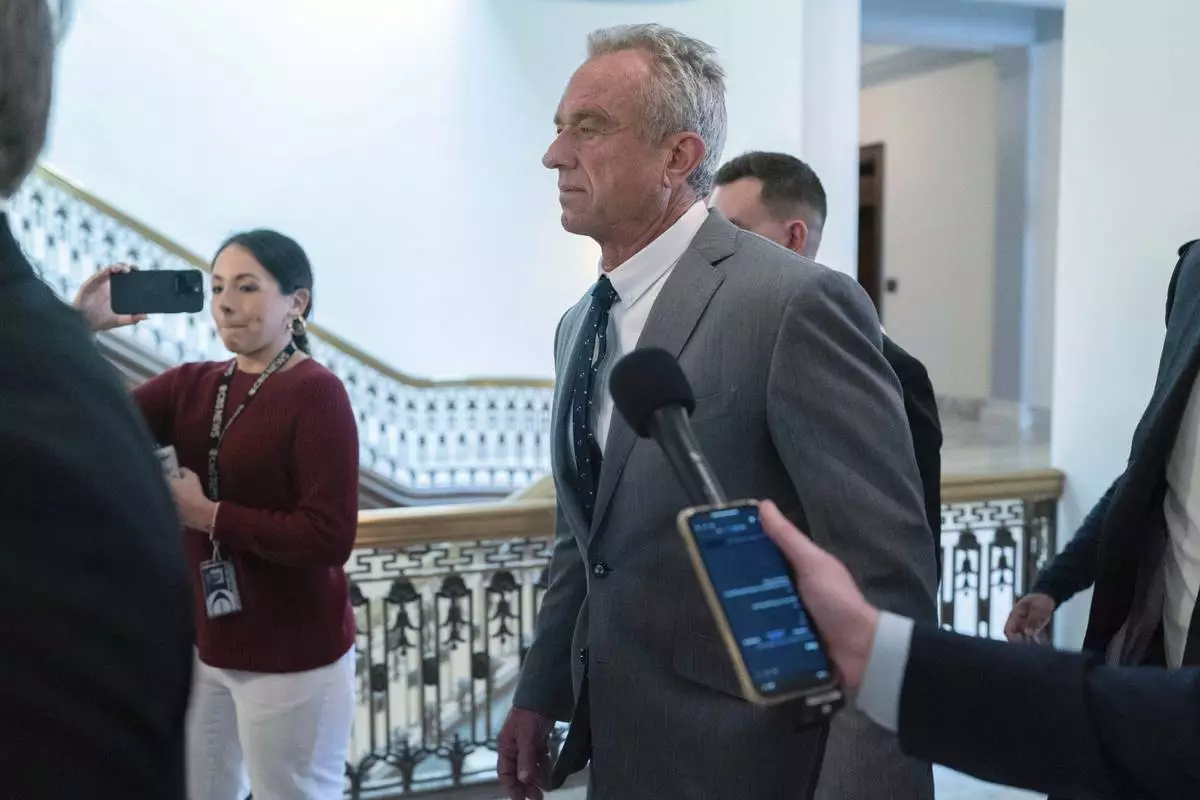
Robert F. Kennedy Jr., President-elect Donald Trump's nominee to be Secretary of Health and Human Services, walks to meet with Sen. Roger Marshall, R-Kan., at the Capitol in Washington, Tuesday, Dec. 17, 2024. (AP Photo/Jose Luis Magana)
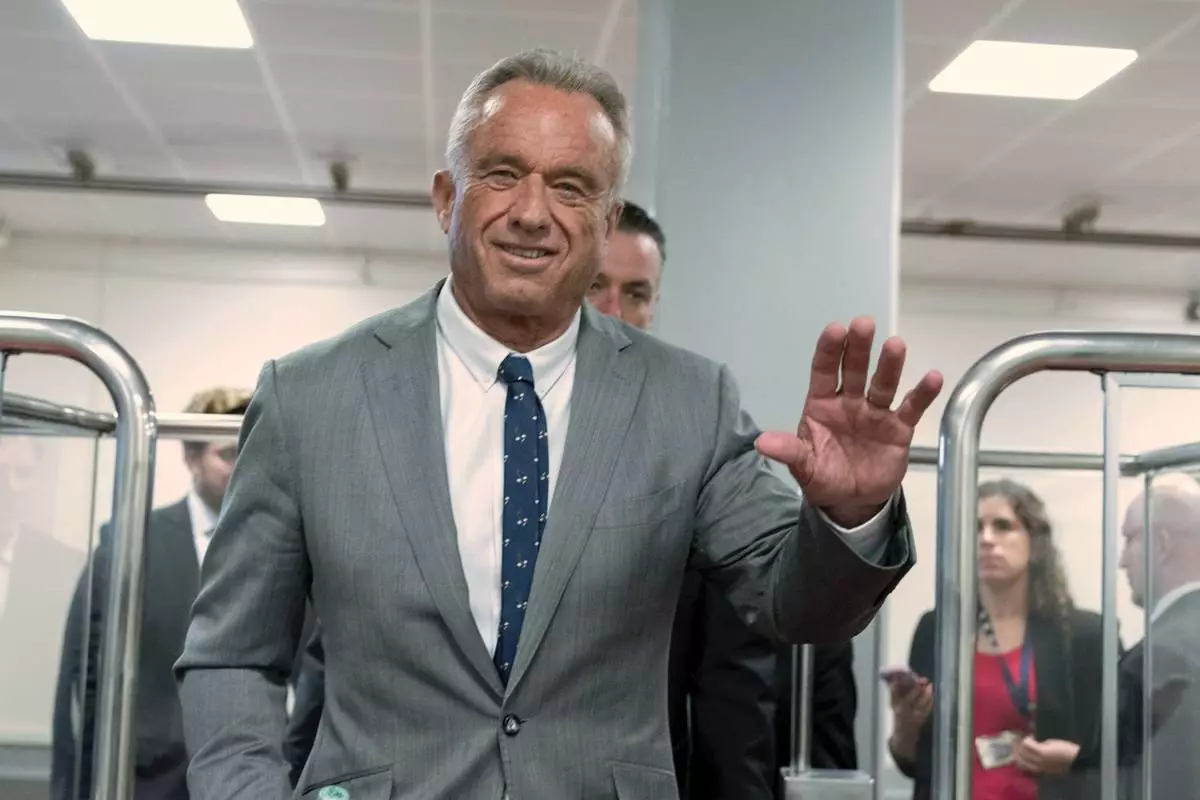
Robert F. Kennedy Jr., President-elect Donald Trump's nominee to be Secretary of Health and Human Services, waves to the media as he rides the train to go to meet with Sen. John Thune, R-S.D. at the Capitol in Washington, Tuesday, Dec. 17, 2024. (AP Photo/Jose Luis Magana)
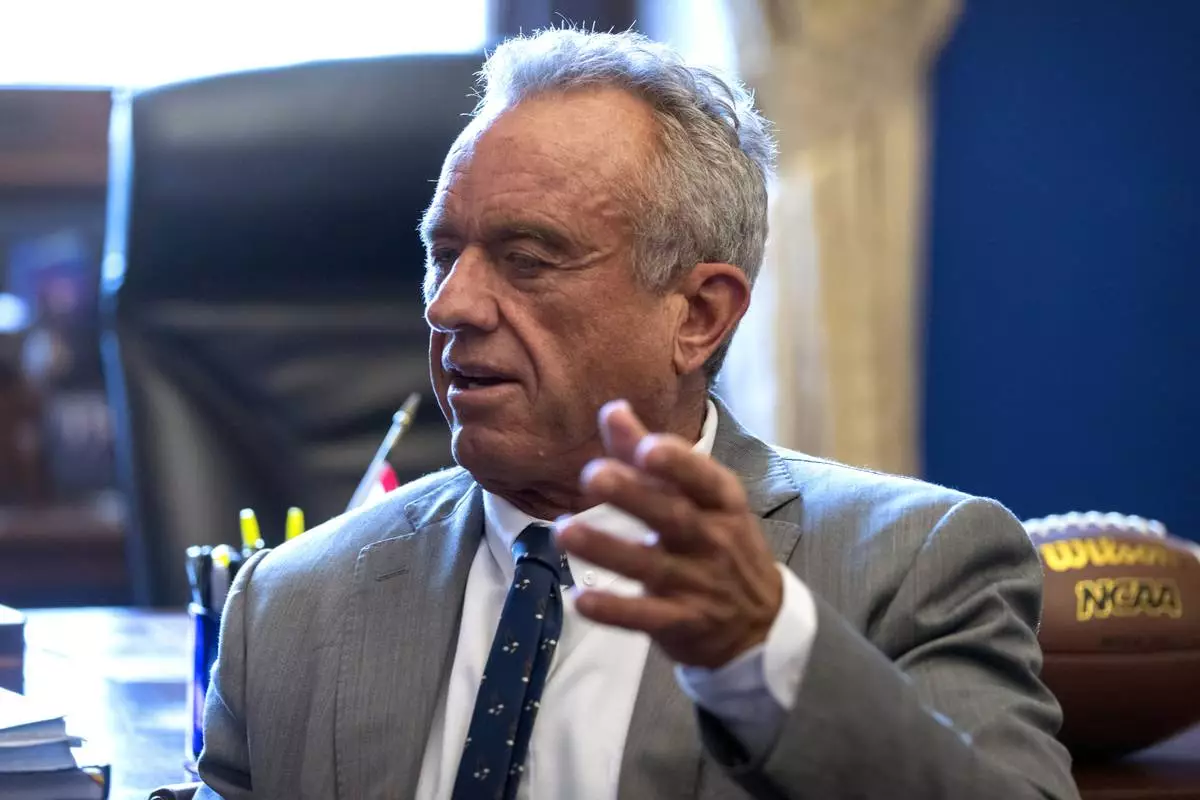
Robert Kennedy Jr., President-elect Donald Trump's pick to lead the Health and Human Services Department, meets with Sen. Tommy Tuberville, R-Ala., on Capitol Hill, Tuesday, Dec. 17, 2024, in Washington. (AP Photo/Mark Schiefelbein)

Robert Kennedy Jr., second from right, President-elect Donald Trump's pick to lead the Health and Human Services Department, rides the Capitol subway as he travels between meetings with senators on Capitol Hill, Tuesday, Dec. 17, 2024, in Washington. (AP Photo/Mark Schiefelbein)
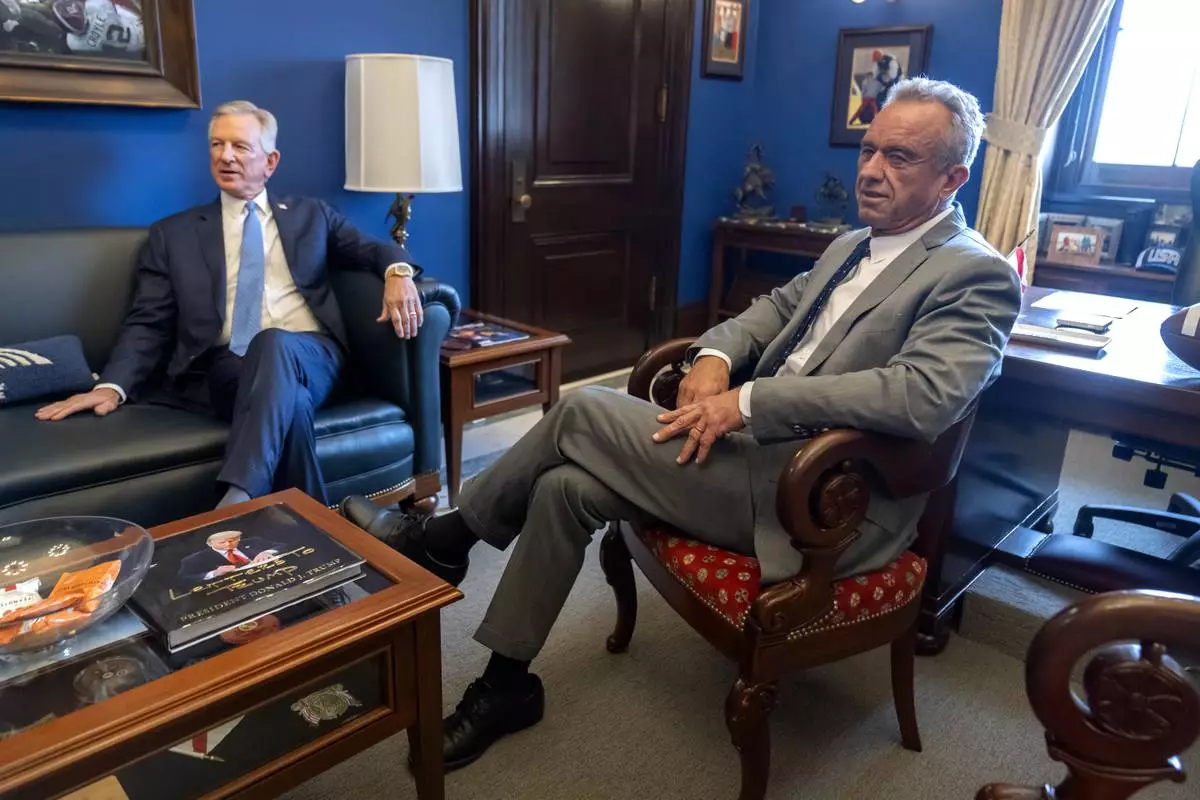
Robert Kennedy Jr., right, President-elect Donald Trump's pick to lead the Health and Human Services Department, meets with Sen. Tommy Tuberville, R-Ala., on Capitol Hill, Tuesday, Dec. 17, 2024, in Washington. (AP Photo/Mark Schiefelbein)
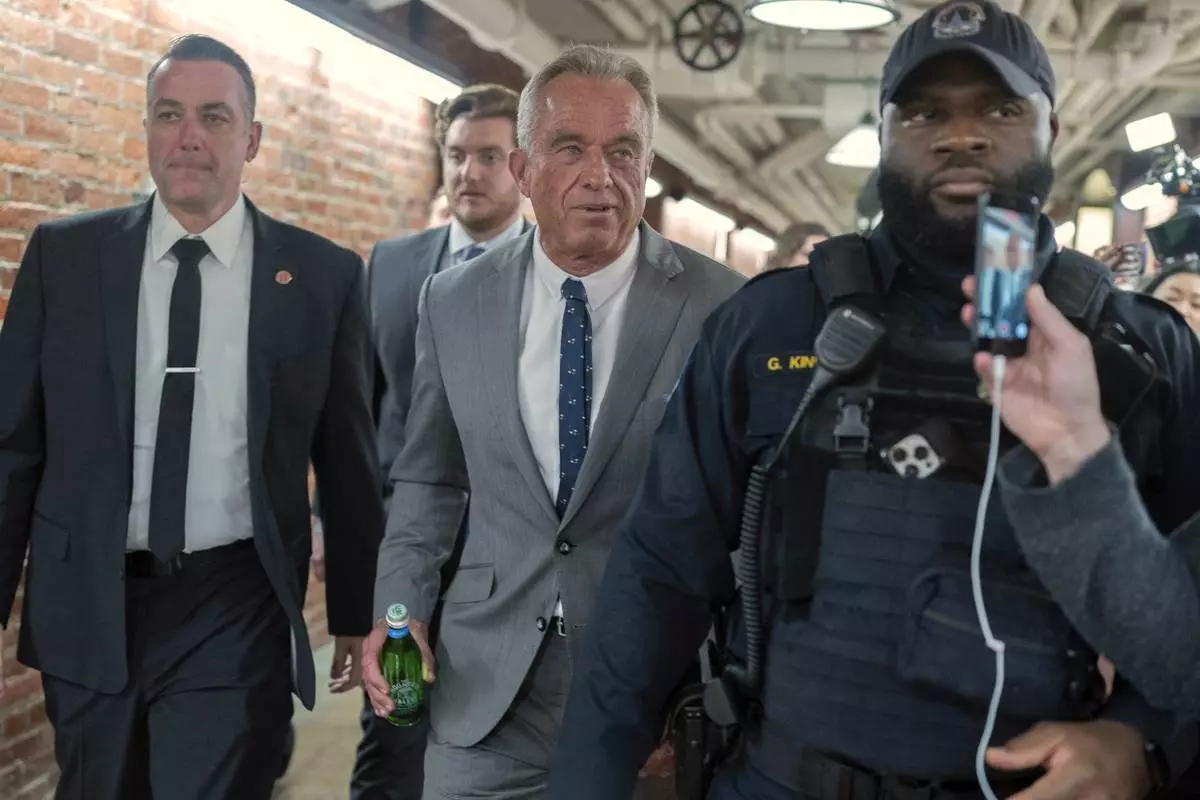
Robert F. Kennedy Jr., President-elect Donald Trump's nominee to be Secretary of Health and Human Services, center, walks to meet with Sen. John Thune, R-S.D. at the Capitol in Washington, Tuesday, Dec. 17, 2024. (AP Photo/Jose Luis Magana)
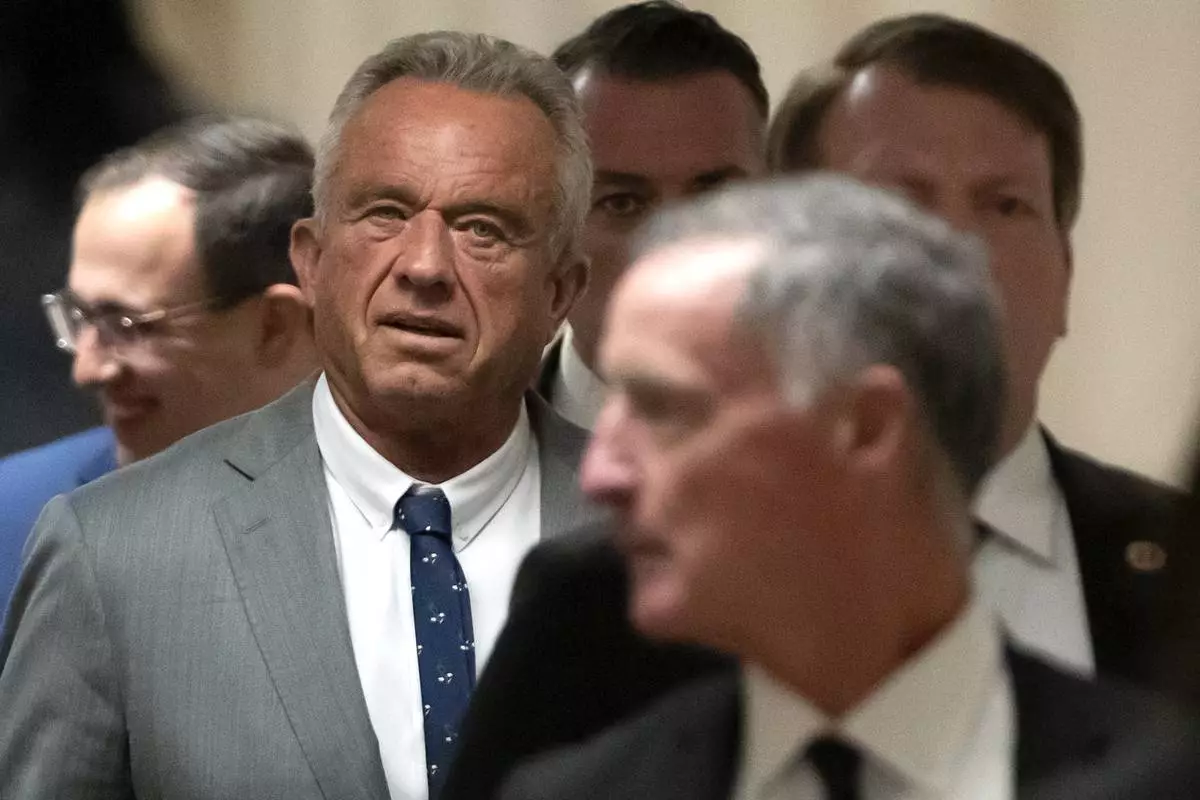
Robert Kennedy Jr., President-elect Donald Trump's pick to lead the Health and Human Services Department, walks between meetings with senators on Capitol Hill, Tuesday, Dec. 17, 2024, in Washington. (AP Photo/Mark Schiefelbein)
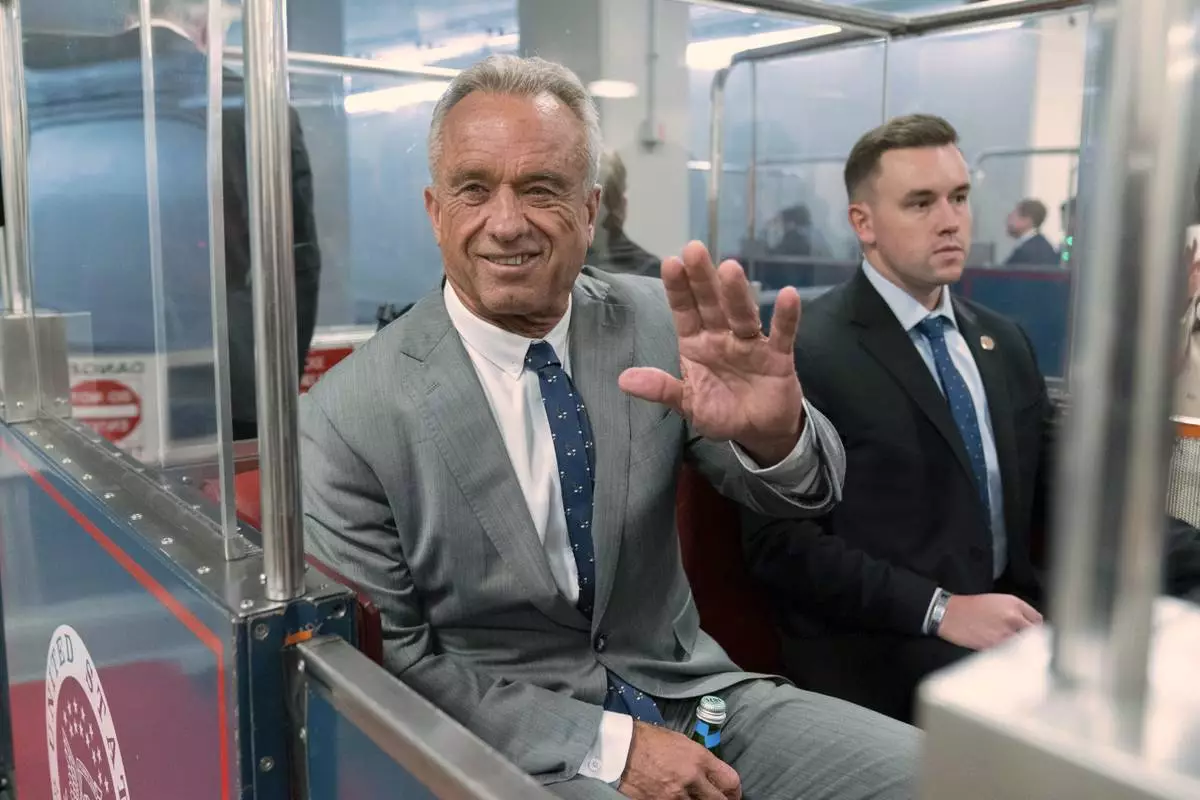
Robert F. Kennedy Jr., President-elect Donald Trump's nominee to be Secretary of Health and Human Services, waves to the media as he rides the train to go to meet with Sen. John Thune, R-S.D. at the Capitol in Washington, Tuesday, Dec. 17, 2024. (AP Photo/Jose Luis Magana)
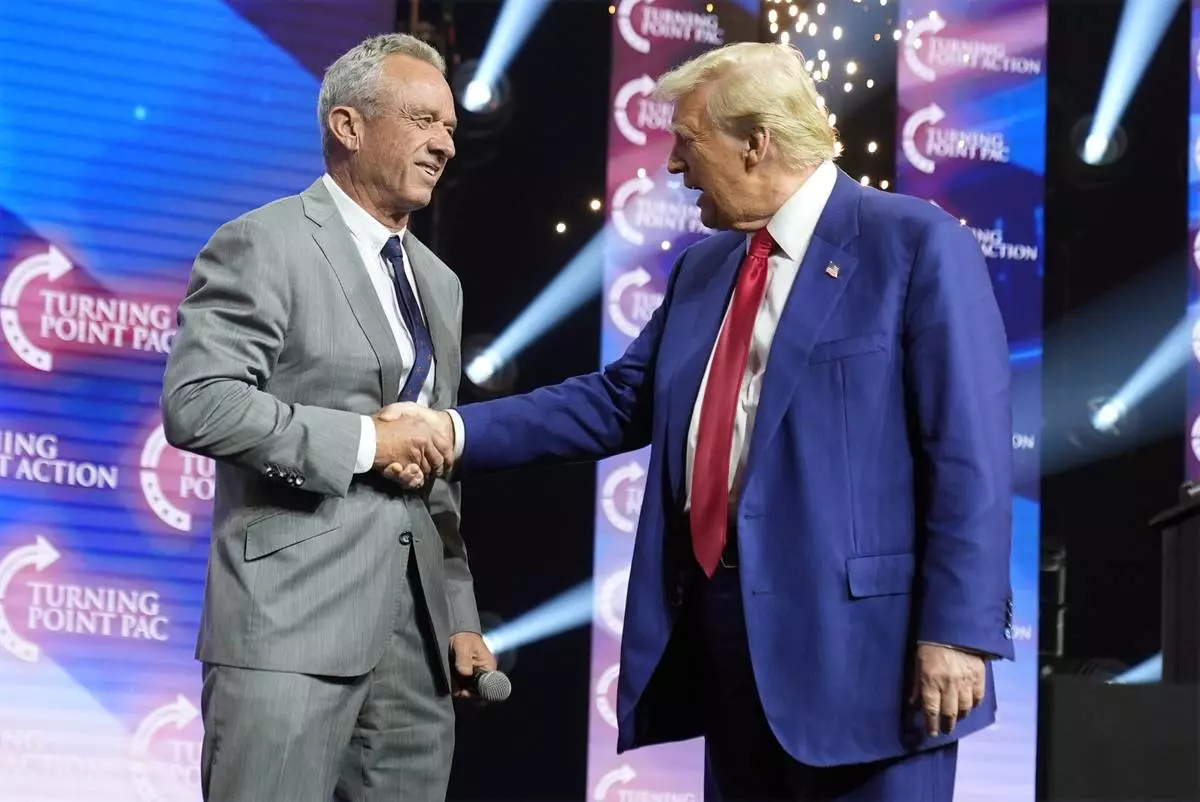
FILE - Republican presidential nominee former President Donald Trump greets Robert F. Kennedy Jr., at a Turning Point Action campaign rally, Oct. 23, 2024, in Duluth, Ga. (AP Photo/Alex Brandon)

















